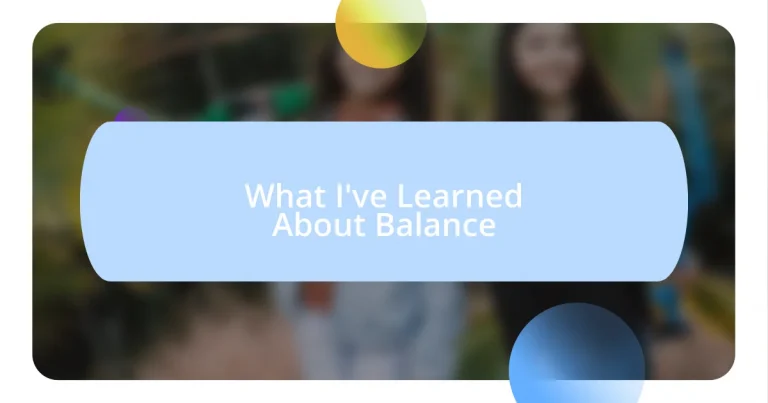Key takeaways:
- True balance involves recognizing priorities and being adaptable, as it is a continuous process rather than a fixed state.
- Establishing boundaries and prioritizing self-care are essential strategies for maintaining personal wellness and preventing burnout.
- Regular self-reflection helps identify what truly deserves attention, allowing for adjustments to create a more harmonious life.
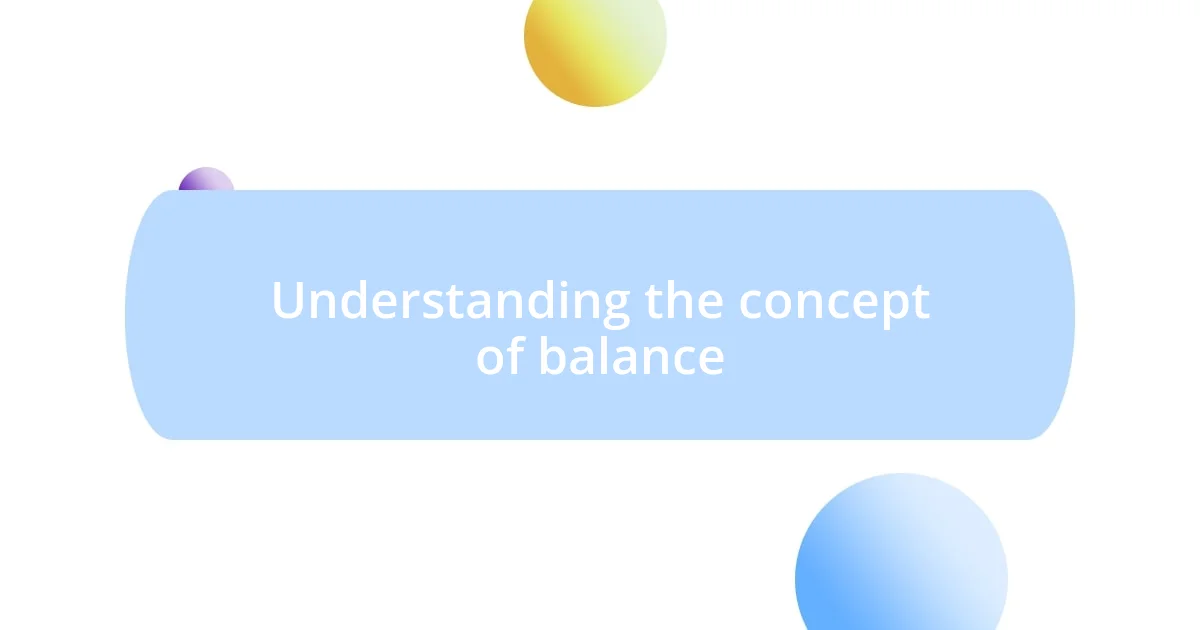
Understanding the concept of balance
Balance isn’t just about finding a middle ground; it’s an intricate dance between various aspects of life. I remember a time when I overloaded my schedule, believing I could juggle work, family, and hobbies all at once. It was then I realized that true balance involves recognizing which areas need more attention and being okay with letting others take a back seat for a while.
Isn’t it fascinating how balance can look so different for each of us? For some, it’s waking up early for a quiet cup of coffee, while for others, it’s diving into a spontaneous evening out with friends. Personally, I’ve found that balance means creating sacred time for self-reflection, helping me recalibrate when life feels chaotic. That introspective time isn’t just a luxurious break; it serves as my compass, guiding me in making better choices.
I’ve learned that achieving balance is often more about the journey than the destination. I recall moments when I chased after a perfect routine, only to find it fleeting and stressful. Now, I embrace the ebb and flow of life, understanding that balance is a continuous process, not a fixed point. Have you ever felt like you’re stuck chasing unattainable balance? I’ve been there too, and it’s liberating to accept that sometimes, it’s about being adaptable rather than perfect.
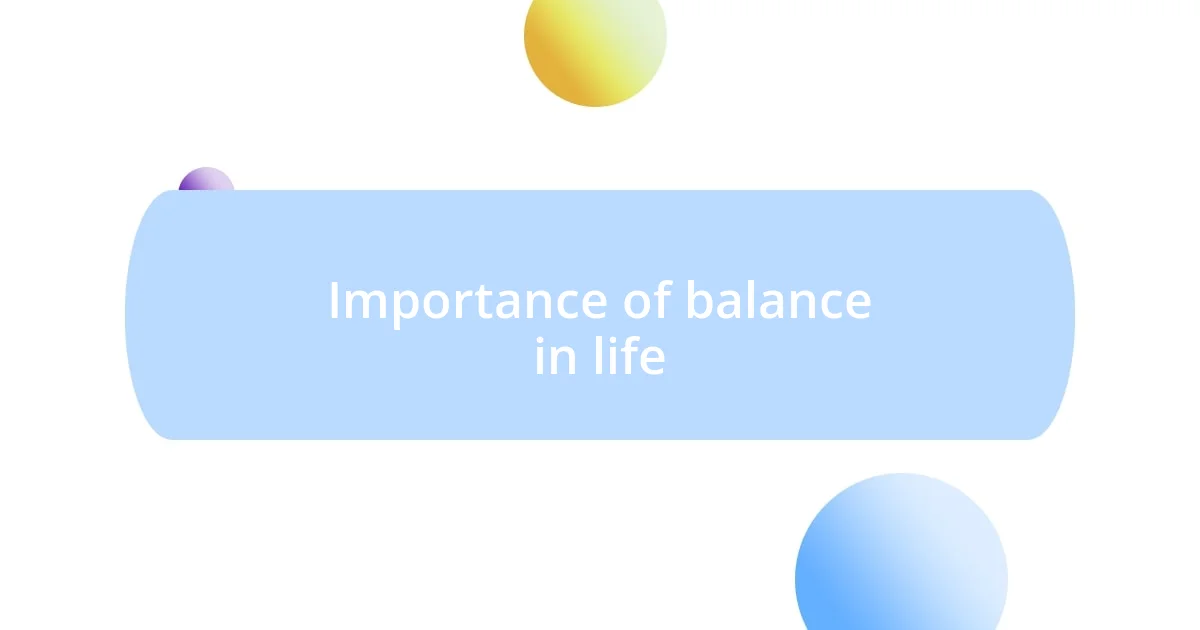
Importance of balance in life
Life balance holds immense importance because it influences our mental, emotional, and physical well-being. I recall a time when I poured myself entirely into my career, neglecting friendships and personal health. That phase left me feeling unfulfilled and burnt out, teaching me that without balance, success in one area can lead to collapse in another.
Moreover, finding balance helps in managing stress effectively. I often reflect on how taking short breaks during a busy workday has made a significant difference in my productivity and mood. I’ve learned that simply stepping away to breathe and reset nourishes my creativity and rejuvenates my spirit, proving just how crucial balance is in maintaining overall wellness.
Finally, embracing balance creates a more harmonious life. I’ve experienced the joy of fostering connections with others while still carving out personal time for self-care. It’s interesting how this dual focus allows me to be more present, both in friendships and in my own mind. Aren’t we all seeking that sweet spot where everything feels aligned? Balance is essentially about harmonizing moments, making it vital for a fulfilling life.
| Aspects of Life | Effects of Imbalance |
|---|---|
| Work | Increased Stress |
| Health | Burnout |
| Social Life | Isolation |
| Personal Growth | Stagnation |
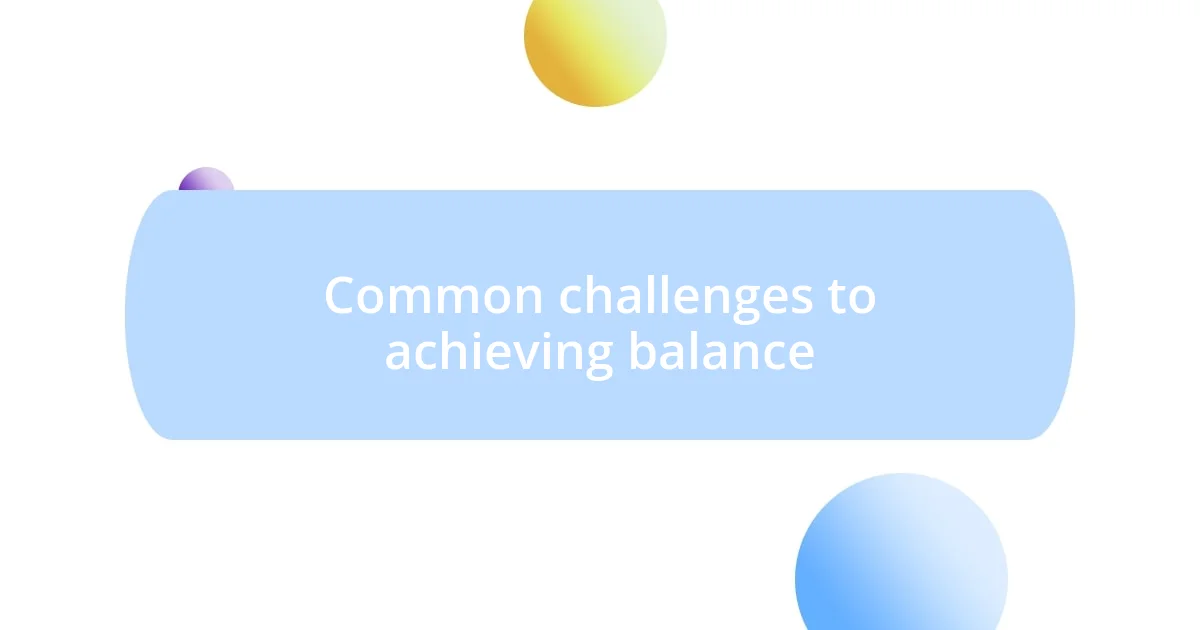
Common challenges to achieving balance
It’s a bit surprising how easily we can slip into chaos when trying to strike that elusive balance. I remember a phase where work consumed my every waking hour, leaving little room for anything else. The result? I felt drained and disconnected from friends and family. This experience highlighted some common challenges we often face when seeking balance.
Here are a few obstacles that tend to get in the way:
– Overcommitment: It’s easy to say yes to everything, but too much on our plates can lead to overwhelm.
– Perfectionism: Wanting everything to be perfect in one area often neglects others, which can snowball into frustration.
– Distractions: In our digital age, constant notifications can pull us away from what truly matters.
– Neglecting Self-Care: It’s tempting to put ourselves last, but ignoring our needs leads to burnout.
When I started recognizing these traps, I learned to set clearer boundaries and prioritize my health. I’ve found that being intentional about how I spend my time helps mitigate these challenges and creates space for true balance.
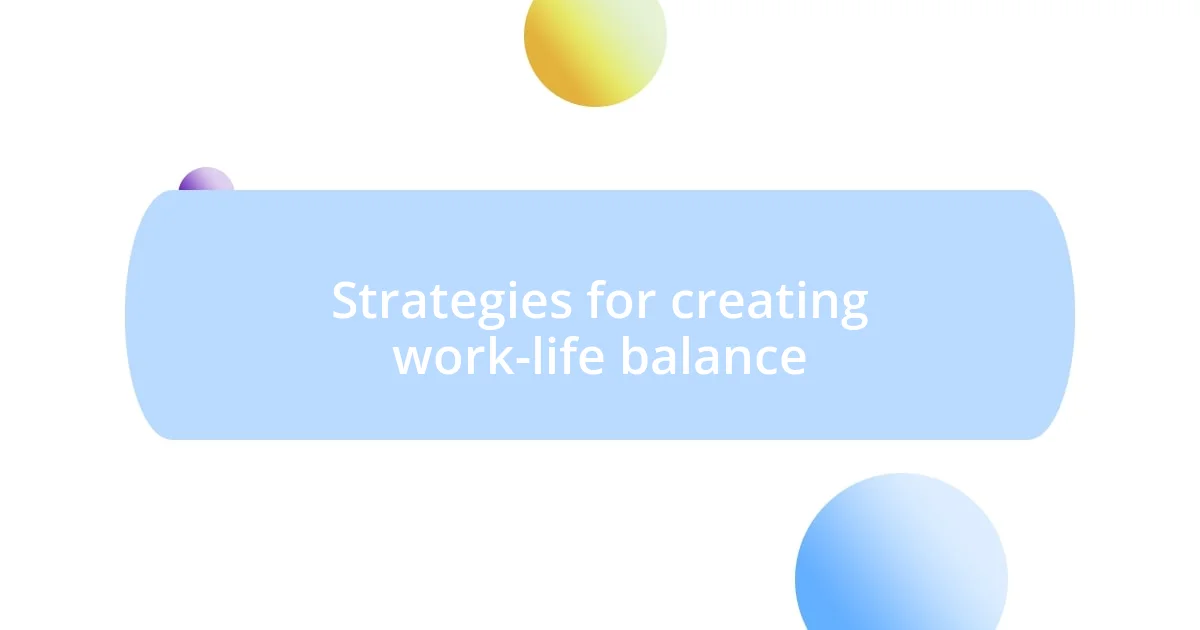
Strategies for creating work-life balance
Establishing boundaries is paramount in creating a work-life balance that works for you. I remember when I first started working from home; I struggled to separate my work hours from my personal time. I found myself working late into the evening, thinking, “Just a few more emails.” But then I realized that setting a strict end time for my workday not only freed up my evenings but also made me more productive during the day. So, how do you know where to draw that line? Start by assessing your daily routine—what can you shift or cut back on to carve out personal time?
Another effective strategy is to embrace the art of time blocking. This technique has been a game-changer for me. I allocate specific blocks of time for work, exercise, and family, which allows me to focus entirely on one task at a time. Initially, I found this rigid; I thought it would stifle my creativity. However, I’ve discovered that having dedicated slots actually enhances my flow. Isn’t it fascinating how organizing time can bring such clarity and purpose to our day?
Finally, prioritizing self-care is non-negotiable. When I neglected my hobbies and downtime, I felt a growing sense of discontent creeping in. I remember picking up painting again after years, and it reignited a spark in me. It was like rediscovering a part of myself that had been buried under work obligations. So, I encourage you—what activity could revive your spirit? Making time for what brings you joy is a vital step toward achieving balance.
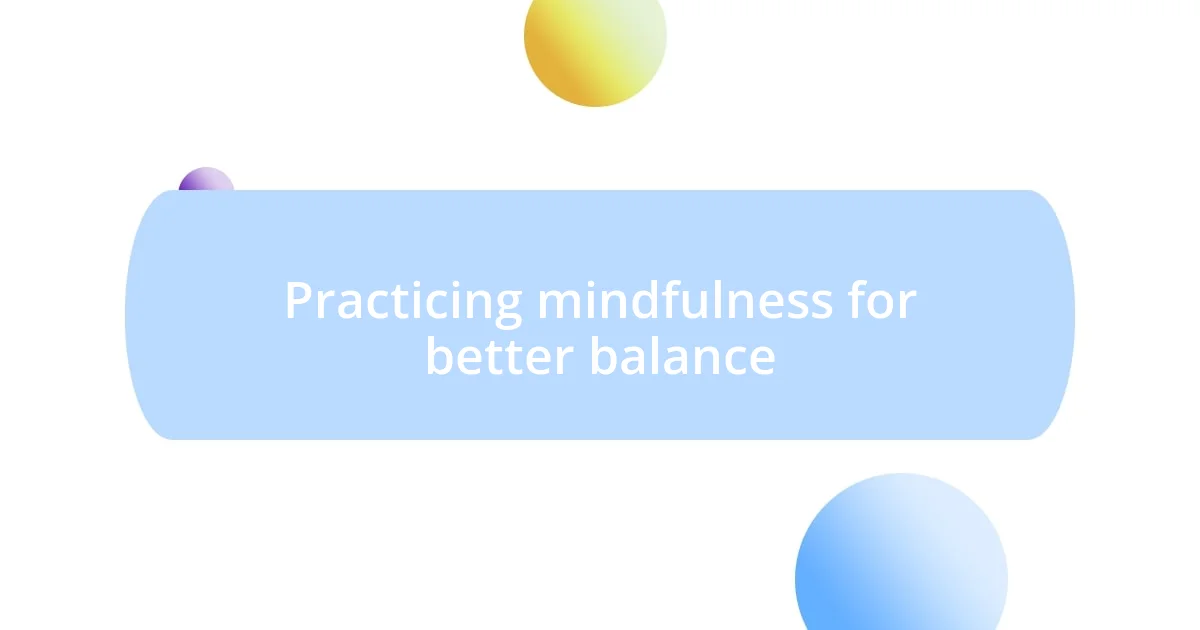
Practicing mindfulness for better balance
Engaging in mindfulness practices has profoundly transformed my approach to achieving balance in my life. There was a time when I rushed from one obligation to the next, feeling perpetually frazzled. When I finally committed to spending just a few minutes each day in mindfulness—like deep breathing or a quiet meditation—everything shifted. This simple act allowed me to pause, reflect, and reconnect with my inner self, grounding me amidst the chaos.
When I’m mindful, I become attuned to my feelings and priorities. I discovered that when I check in with myself, I can identify what truly matters each day. For instance, I used to feel guilty about taking a walk during work hours. However, by mindfully embracing that time, I realized it rejuvenated me tremendously. Have you ever noticed how those momentary breaks can spark fresh ideas and boost your productivity? It’s like pressing a reset button.
Incorporating mindfulness into my daily routine has also improved my interactions with others. I remember a time I walked into a meeting overwhelmed and distracted. Practicing mindfulness beforehand transformed my presence; I was engaged, listening, and responding thoughtfully. This not only fostered better connections with my colleagues but also created a cooperative atmosphere. Isn’t it remarkable how being fully present can enhance our relationships and promote a sense of balance?
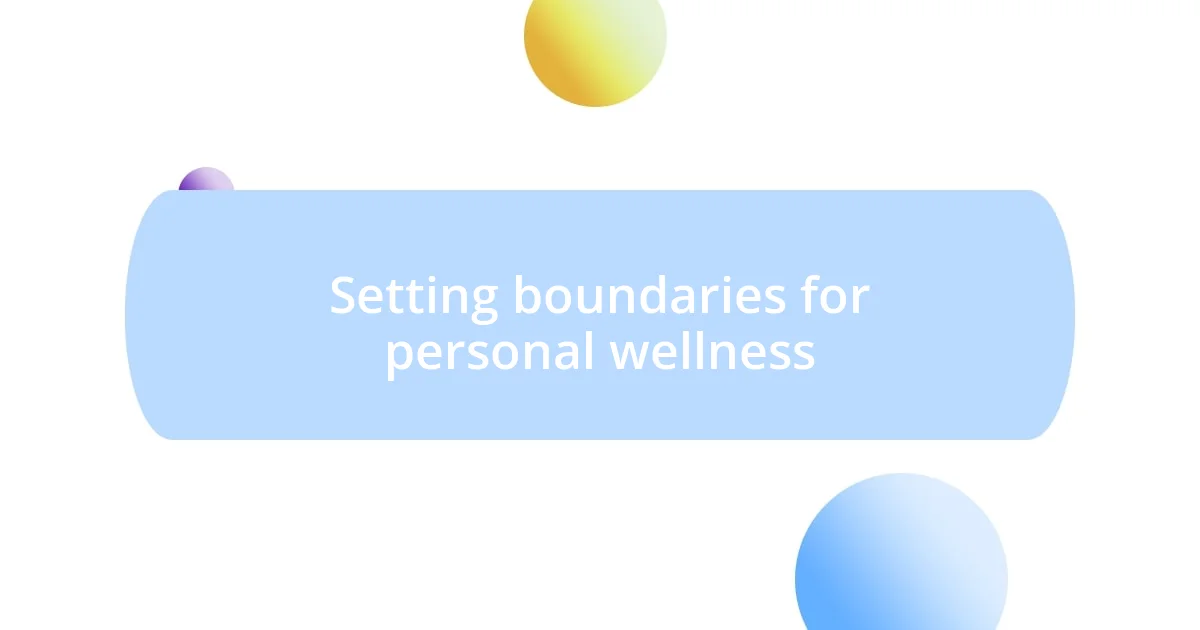
Setting boundaries for personal wellness
Setting boundaries for personal wellness is a journey that requires introspection and honesty. I vividly recall a time when a friend pointed out that I was always available for work-related calls, even on weekends. It struck me then that I needed to draw a clearer line. By turning off my work notifications during my downtime, I quickly discovered the joy of uninterrupted family time. It was like a breath of fresh air—have you ever felt that bliss when you step away from obligations?
I’ve also learned that saying “no” can be one of the most liberating choices for personal wellness. At first, I hesitated, thinking it might disappoint others. But each time I respectfully declined an extra commitment, I felt a weight lift. It became apparent that prioritizing my mental health allowed me to show up more fully in other areas of my life. Can you relate to that feeling of lightness? By creating space for what truly matters, we can invest in our own well-being.
I remember a season when I was overwhelmed with responsibilities and social obligations. I began setting specific days for social activities and reserved other days strictly for personal care and reflection. This intentional planning made a world of difference. The balance shifted from chaos to calm, and each “me day” became a cherished sanctuary. Have you ever carved out time just for yourself? It’s incredible how much clarity emerges when you prioritize your own needs.
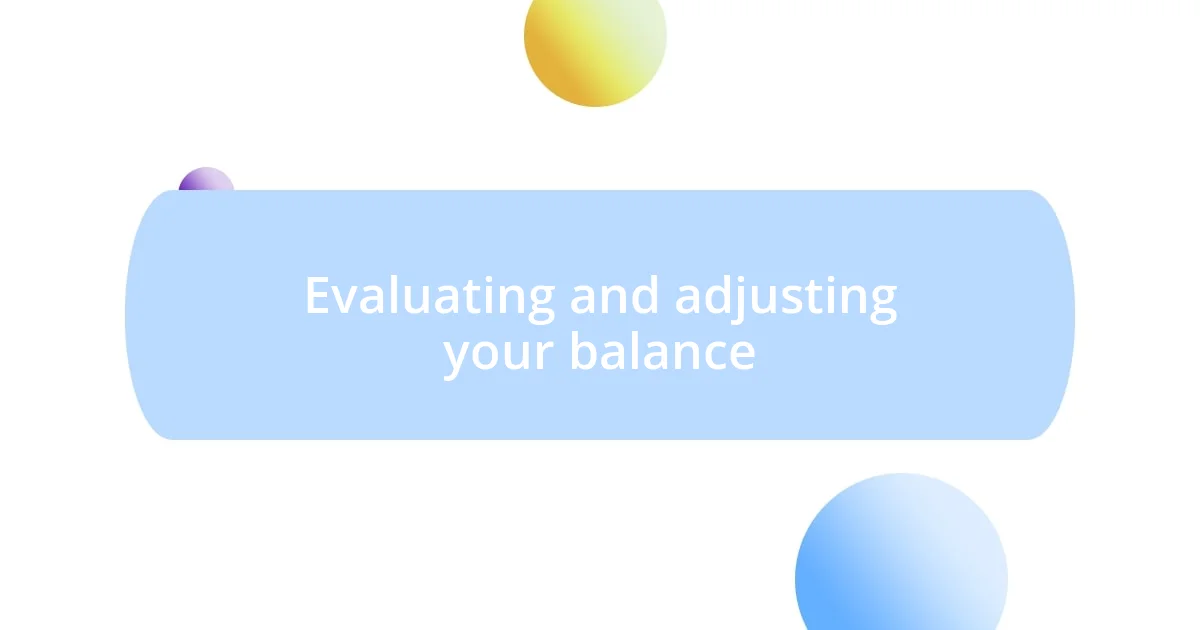
Evaluating and adjusting your balance
Finding the right balance often requires a moment of self-reflection. I recall a particularly hectic period when I was juggling multiple projects at work. Amidst the chaos, one evening, I took a quiet hour to sit down and assess what truly needed my attention. That deep dive into my priorities revealed which tasks felt joyless and overwhelming—those were the ones I decided to adjust or delegate. Have you ever felt the weight of responsibilities lift when you identify what truly deserves your energy? It’s a profound realization.
As I navigated my quest for balance, I realized the importance of flexibility in my plans. For example, I scheduled a weekly workout but noticed it often clashed with other commitments. So, I started viewing my exercise not as a rigid appointment but as an evolving part of my week. If something came up, I’d simply shift my workout to a different time. This approach not only helped me stay active but also alleviated the stress of feeling like I was constantly sacrificing one commitment for another. Isn’t it refreshing when we give ourselves permission to adjust?
Moreover, creating a feedback loop—where I consistently gauge my feelings about my commitments—has been instrumental. Recently, during a particularly busy week, I felt drained and uninspired. By taking a step back, I acknowledged that I needed more downtime to recharge. So, I carved out an evening just for myself without any obligations. The relief was palpable! Have you ever noticed how, sometimes, the simplest adjustments can offer the greatest relief? Adjusting my balance has truly become a dynamic process, one that I embrace with openness and curiosity as life unfolds.












